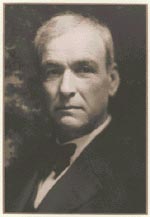

  |
 'Buffalo Bill' Cody |
Buffalo Bill After
the job at Omaha, Uncle Bill landed a job, which took him to North Platte
in western Nebraska, where he worked on a paper. "That's where I began to
run across celebrities," he said. |
 John M. Thayer |
| Salisbury had been running
'Salisbury's Troubadours' a kind of a song show during the late 1870's and
saw the possibilities. Cody never had been a grade above enlisted man. When
the first 'Wild West' started from Omaha in the spring of 1883, he was 'Colonel
Cody'. Alfred Sorenson, a newspaperman, got him that title from Governor Thayer,
who appointed Cody on his staff. Cody said the title would carry him better
at home and abroad, and it sure did. I am pretty sure it cost him a thousand
dollars-though only Al Sorenson and the Governor could tell who divided the
money." As published in The Oregonian on February 1st, 1923. |
From Nebraska, to
Idaho |
| In 1876
Uncle Bill drifted back to Omaha and got a job as reporter. "That was the job whereon I really got acquainted with people," he said. "Only one train a day each way across the continent. Used to get up early and hop No. 3, riding west to the meeting point and return at 3:30 to do the regular day's business, with a pocketful of stories of men small and great traveling between New York and San Francisco. Worked on all the Omaha papers and handled telegraph and exchanges on the Bee, with occasional paragraphs, and in 1883 listened to the song of Robert E. Strahorn, whom I had know when Jay Gould had him doing publicity, and I put an outfit aboard a train and went west to start the Caldwell Tribune and help start the town in Idaho. As published in The Oregonian on February 1st, 1923. |
|
|
 |
There's a story about E.W. Howe I used to like to tell his daughter Mateel and the boys when they were here 15 or 20 years ago. Think it was in the summer of 1878, when I was chumming around the Omaha Republican, handy to have around. The office sent the city editor (that was more of a courtesy title-local editor was better) to New York to rustle 'foreign' advertising. There were but a few general advertising agents in those days and many papers went after it independently. First night I printed a local like this: T.W. Miner went east yesterday, to be gone a few months. W.J. Cuddy is doing the work temporarily. That was to let people know me when they saw me. I used the word 'temporarily' because I hoped to get back inside. In a day or two came an application from Ed Howe for the job, noting the 'temporarily.' The powers wrote back that I'd have to stay on it. Ed then was at Nebraska City or Falls City, down the Missouri. He gathered a case of type and a little furniture and a job press and moved to Atchison. |
| Colonel Anthony, who 'fit' in the civil war, was then running the Champion, a fire-eating Abolition paper. Howe started what he called the 'Little Globe,' two pages about the size of your hand; ran around Atchison in the morning, gathering locals, put them in type, made up (he was a thoroughbred printer), ran them off and peddled them at 5 cents each-and sold all he printed. His idea, first humored, became an obsession with Atchison business men; they devoured his humor and philosophy, and in a short time the 'Little Globe' was the Atchison Globe, a real newspaper. The rest of the story can be found in two or three volumes-if ever they are written, and they'll be mighty interesting reading. I like to think that because I was holding the job he wanted at the turning point I helped some in a negative way. It shows what adversity will bring out of a man if it's in him. It was in Ed Howe in large containers. As published in The Oregonian on February 1st, 1923. |
CONTINUE THE TOUR . . .
![]()
NEXT PAGE